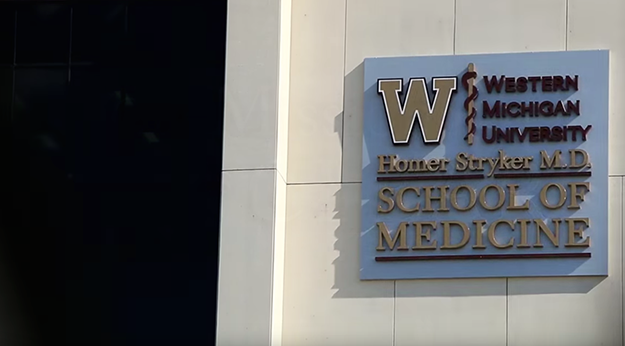
As the COVID-19 pandemic has had an unprecedented impact across the world and locally in Kalamazoo over the last 16 months, medical school leaders have sought out ways to keep WMed employees engaged, to ensure they can do their work safely and effectively.
In March 2020, almost overnight, many WMed employees shifted to working remotely as WMed leaders responded quickly and established the technology and resources necessary to make the transition as seamless as possible.
“It really has been all hands on deck at WMed since last year as we saw the pandemic begin to take hold,” said Rich Daudert, the medical school’s manager of Organizational Development.
And that sense of working together, of collaboration and community during the pandemic, is captured in the results of the 2021 WMed Employee Engagement Survey.
WMed partnered with Press Ganey Associates, Inc., to administer the survey from January 12 to January 29, 2021, to employees including faculty and staff. A survey was also conducted in 2019.
Seventy percent of WMed employees completed the 90-question anonymous online survey.
Overall, the institution saw significant growth – more than four percentage points compared to two years ago – in its engagement indicator score, which is a composite metric that includes employees’ degree of pride in their employer, their intent to stay, their willingness to recommend their employer to friends and family for care, and their overall satisfaction with their workplace.
Daudert said the improvement in engagement is reassuring, especially during the pandemic, that many of the initiatives medical school leaders have taken on over the last two years are having a positive impact. He noted that the survey results for WMed occurred at a time when most other healthcare organizations saw a decrease in employee engagement.
Since 2019, the medical school has taken on a number of new initiatives aimed at boosting employee engagement. New wellness check-in opportunities, educational workshops, and group offerings, including fitness, yoga, and mindfulness meditation are available to the WMed community, coordinated by Karen Horneffer-Ginter, associate dean for Culture and Wellness, who came to the medical school in 2018.
During that same time, WMed also improved its overall benefits package, including offering a fitness stipend to help employees pay for the cost of their gym memberships and other well-being activities. Additionally, the medical school instituted a Rewards and Recognition program for employees to recognize the good work of their colleagues, and found creative ways to help employees stay connected with each other during the pandemic through virtual team-building activities and a behind-the-scenes video series.
Meanwhile, efforts around diversity, equity, and inclusion continue and many new programs, including the Courageous Conversations and Community Conversations series have been implemented under the leadership of Cheryl Dickson, MD, MPH, associate dean for Health Equity and Community Affairs, and Donovan Roy, EdD, who came to WMed in May 2020 as the new assistant dean for Diversity and Inclusiveness. More recently, the Office of Diversity and Inclusiveness hosted the 2021 WMed and AAMC High School and College Student-Athlete Medicine and Healthcare Career Conference, a national event highlighting how former student-athletes have adapted their skills in sports to become competitive healthcare professionals off the field.
“There’s no doubt that we have more work to do as we move forward, but that steadfast commitment to making WMed a welcoming environment for all while helping employees enjoy good work-life balance will help ensure that we get to where we need to be in terms of employee engagement,” Dr. Horneffer-Ginter said.
Daudert said the steps WMed leaders took in 2020 in the face of the pandemic only helped to enhance employee engagement. Employees were able to work effectively, efficiently, and safely from home and the medical school’s senior leadership team was intentional in its work and decisions aimed at keeping employees whole with no job and salary cuts amid the uncertainty brought on by the pandemic.
During 2020 and much of 2021, employees at WMed Health continued to see patients in person and via telehealth during the pandemic. WMed Health employees, as well as other faculty and staff from WMed also stepped up in the community beginning in February 2021, working as medical and non-medical volunteers to staff the Kalamazoo County COVID-19 vaccination clinics at the Expo Center. WMed volunteers staffed a total of 544 shifts at 47 clinics for a total of 2,176 hours of time.
"We had to increase our communication channels to employees as change became a norm during this pandemic,” said Naren Kumar, the medical school’s assistant dean for Clinical Affairs. “WMed Health increased huddle frequency, rounding, and moving daily touchpoints to a virtual platform. Flexibility and communication become critical to engage employees, residents, and faculty members. The ability to be adaptive was key to ensuring patients had care access through the pandemic. WMed Health was able to deliver telehealth options immediately and participated with the county health department in the vaccinations drives."
Among other results of the employee engagement survey was the significant improvement in leader-employee relationships, as well as the overall score measuring how connected employees feel to WMed, which saw a six percent jump.
Most significantly, the survey showed that employees at WMed feel more connected to their supervisor or manager, a category on the survey which saw a nearly 10 percent increase in the overall score.
Daudert said that from 2019 until 2021, WMed leaders have had an intent focus on improving communication, improving relationships between supervisors and their direct reports, as well as recognition for faculty and staff. He said the recent employee engagement survey results show those efforts have not been in vain.
“We’ve come really far and we’ve made significant improvement,” Daudert said. “And we know we have more to do as this work continues.”
Daudert and Horneffer-Ginter said that as the work continues to improve employee engagement at WMed, the feedback from this most recent survey will be extremely valuable and play an integral role as next steps occur and decisions are made at an organizational level.
